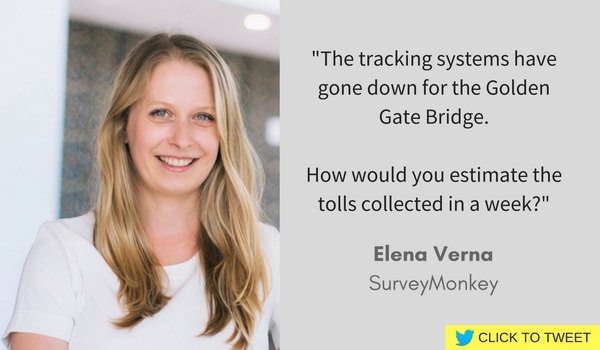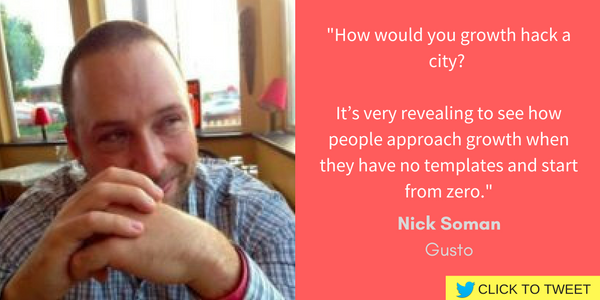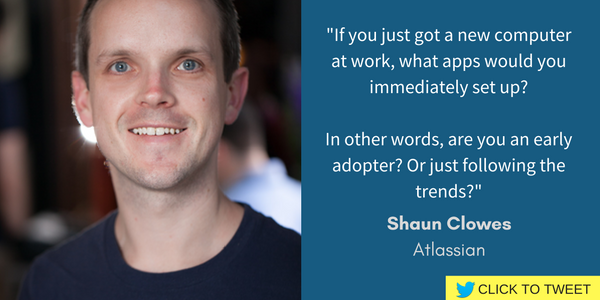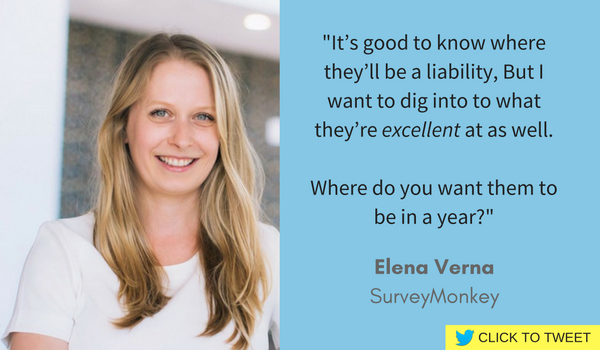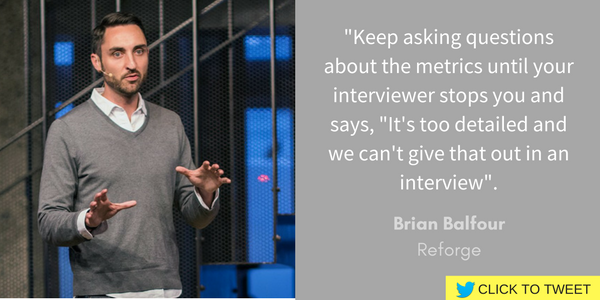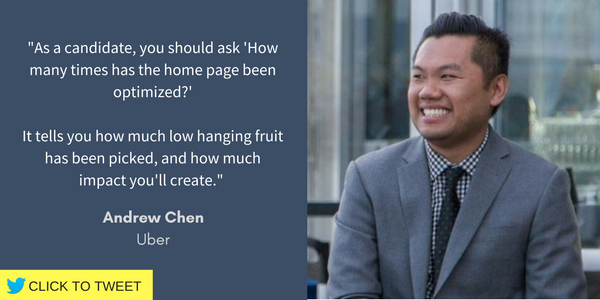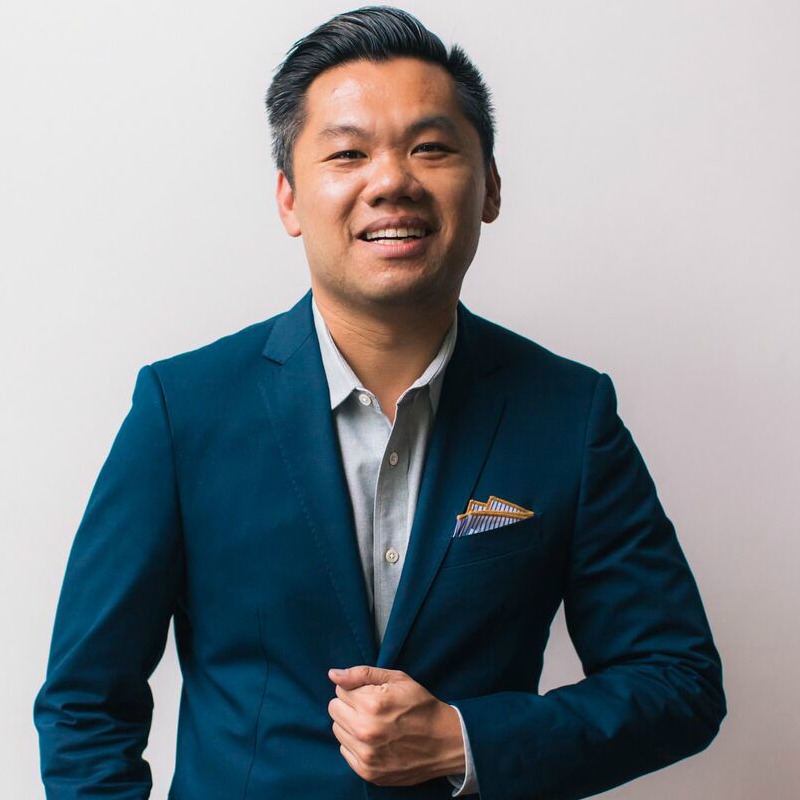Growth Interview Questions from Atlassian, SurveyMonkey, Gusto and Hubspot (Guest Post)
[Andrew: Excited about today’s guest post! I was recently interviewed by the folks at Reforge, a new company started by my friends Brian Balfour and Susan Su focused on advanced professional education. They asked a great question – how do you interview for growth folks? I gave some my 2 cents based on my experience helping startups and growth folks. They pulled together a great essay below!]
Growth Interview Questions
Guest Essay by Susan Su, Reforge
Together, Shawn Clowes (Atlassian), Elena Verna (SurveyMonkey), Nick Soman (Gusto), Andrew Chen and Brian Balfour (Reforge, previously at Hubspot) have interviewed or screened over 1,000 individual candidates for growth roles – both for their current and previous companies, plus startups where they’ve invested/advised.
Growth is an emerging field, and there’s hardly a playbook on how to ace your growth interview (whichever side of the table you’re on), and yet hiring and team could be the most important “growth hack” of all. I recently asked a handful of folks from the Reforge Collective about the questions they ask when interviewing candidates for competitive positions in growth.
Here are some of the questions we’ll cover:
1. The Golden Gate Bridge
2. Growth Hacking a City
3. Are you an early adopter?
4. Live brainstorm an experiment backlog
5. What Are Your Setbacks?
6. Look for opportunity, not just risk
7. But… why?
8. The Bullshit Test
9. The Trajectory of Growth
10. Probe on Metrics
11. And on Culture
12. 6-Month Roadmap
13. Growth Resources
14. Low Hanging Fruit
If you’re looking for your next job in growth, or you’re trying to fill one at your company, consider this a peek into how a few other growth marketing experts are structuring their growth interviews.
This 1 Weird Interview Question
Growth is as much about showing creative problem solving as much as quick metrics-based iteration. If a candidate is out there googling answers to “trick” interview questions, then they’re missing out on an opportunity to showcase their own unique way of combining creativity with numbers.
“Weird” interview questions let you out to roam beyond the constraints of the role in front of you. The best weird questions are designed to highlight original problem-solving, and if that doesn’t excite you, then a position in growth probably won’t be fun or fruitful.
1. The Golden Gate Bridge
When she was still a candidate interviewing at SurveyMonkey, Elena Verna fielded an unusual interview question that she continues to use in her own growth interviews to this day:
Let’s say you were to come in tomorrow, and you got a new project to work on the Golden Gate Bridge and its toll collecting. But, you’re told that they’ve recently lost all of the tracking of both traffic flow and revenue collection, and your boss has just told you that you need to come up with a revenue estimate in the next 15 minutes. You don’t know anything about how much has been collected historically. All you have is a blueprint of the bridge.
How would you estimate how much revenue or the bridge generates on a weekly basis?
Elena explains that the question is meant to demonstrate your problem solving skills (not to get to the “right” answer necessarily).
For me it’s a sign that you’re willing to tackle an open-ended question in a creative way — without all of the data and answers. How am I going to approximate with only broad strokes of knowledge? What are the key variables (Bridge length? Car length? Car weight? Traffic volume?), and how far can I go in 15 minutes?
Elena insists there’s no right answer. Instead, it’s a window into your process of thinking with uncertain variables — and also how excited you get when you’re tasked with reasoning through an unsolved problem.
2. Growth Hacking a City
Ultimately, hiring for your growth role is both high risk and high opportunity. The teams with the most at stake (and offering the best opportunities) will need to explore every last corner of a person’s thinking and style, and that sometimes means taking a lateral approach.
Nick Soman poses an unusual question designed to get at the way candidates think about growth beyond the templates and playbooks that circulate in the growth community:
How would you growth hack a city?
It’s not an immediately technical or product-based experience, and yet it’s an interesting question that might actually become more and more relevant. How would you attract residents to it? How would you attract the other people and elements that that ecosystem requires? What mechanisms would you employ to grow your city? It’s very revealing to see how people approach growth when they have no templates, when they start from zero.”
3. Are you an early adopter?
Have you ever thought about your own relationship with Snapchat? Have you broken down your own psychology of engagement with Facebook? How about for lesser-known, non-consumer products that are in your life?
We are what we eat, and the products and apps we consume (and how we interact with them) can say a lot about who and how we are when it comes to creating and growing our own products and apps.
Shaun Clowes wants to know what you’re using at work:
If you just got a new computer at work, what apps would you immediately set up?
I’m looking for their take on a piece of software that they care about, something that gets them excited, and then how they explain it to me.
What are the most recent apps you been playing with on your phone?
That gives me insight into how in touch you are with the industry, how much you’re seeking out things that are different or somewhat common, and whether you’re an early adopter of things.
4. Live brainstorm an experiment backlog
It’s the default to come prepared to a growth interview. You’ve looked at their core growth loops, you’ve analyzed their funnels, and you have an (externally informed) idea of where the business is going. But what if you were put on the spot to dig even deeper into how the business can grow?
Nick Soman wants to see candidates live-brainstorm an experiment backlog:
How many ideas can you come up with in 3 minutes? Maybe it’s a handful, let’s say 5. Then, I really want to push for a 6th or a 7th.
I want to see the candidate beyond their comfort zone and extend beyond their pre-planned ideas and analysis, especially in real-time. I resist the urge to ask follow-up questions — even when I’m really curious — because I want to see you go for breadth, and then I want you to be able to follow that up with an objective assessment of those ideas.
5. What Are Your Setbacks?
If none of your experiments are failures, then you’re probably not testing the right things. Running growth means swimming in setbacks — and it helps if you’ve had some life experience with that.
Andrew Chen says the level of your setbacks say more about you than their specific details:
One of the questions that I like a lot that doesn’t have to do with growth but tells you a lot about a person is to ask about someone’s biggest setback, either personally or professionally. You can get a sense of if that’s a real setback and how they reacted to it.
For example, someone who’s very junior is going to come up with a small setback. They’re going to say, ‘Oh well at work I did a project and it sucked.’ That’s very different than something like, ‘I was at a company and I convinced the board to do something and it was a long decision and the company failed. And everyone got fired.’ Or, ‘I moved from country A to country B, left my family and friends and started over again.’
Understanding setbacks helps you understand what a person’s priorities are, and how much resilience they have to bounce back.
What Most Growth Interviews Are Missing
6. Look for opportunity, not just risk
A lot of people try to understand a candidate’s weaknesses, but Elena Verna wants to know your superpower. Early to mid-stage growth is as much about doubling down on unique advantages as it is about fixing leaks (ie, identifying and addressing weaknesses). Later, the truly stand-out orgs are the ones defined by their unfair advantages, particularly in growth and product.
Building a growth team is a microcosm of the trajectory you want to see that team take, according to Elena:
Very few growth managers will look at an opportunity in a person and say, “Ok, these are your strengths and I’m actually going to tailor a roll around you to make sure that I’m playing to your strengths.
It’s good to know what people aren’t good at — where they’ll be a liability. But I want to dig into to what they’re excellent at as well. That’s what you really need to focus on, and to make sure that that strength aligns with the position at hand or that it’s possible to mold the position around it.
Too often, we identify a problem or a hole in the business and start looking for the person that will fit it. The person you find could be effective very early on, but evaluating too tightly against specific role can be very short-sighted. Yes, they might be able to sort out that immediate issue for you but in the same stroke you may end up hiring the wrong person long term.
The real opportunity is finding the person who will be happy (and make your business happy) as the definition of growth itself expands, and the immediate problem becomes obsolete. Where do you want them to be in a year? Look for the opportunities, not just the “urgent” holes.”
7. But… why?
Most of us aren’t professional interviewers. We know our area, or we know growth marketing as a broader domain, and we stick to what we know. But, in building a growth team, you’re called to ask people about things that may not be your cup of tea.
As a result, many of us don’t dig into the details of a candidate’s experience, which is a bad idea for both the hiring organization and the candidate — the former misses out on opportunity and risk assessment (is this person a good fit?), and the latter may not get to tell their punchline.
Shaun Clowes asks a deeper layer of question where most interviews have called it a day.
Most interviewers will ask you a question about how in the past have you done X thing. You give them a surface-level answer like ‘We did Y and then achieved Z.’
A few ways to drill in more deeply would be to follow up with questions like:
- When you say “we,” how much was you and how much was everybody else?
- Were you really pivotally involved in this or was this really something that you just got carried along with?
Sometimes it feels like the answer has been rehearsed. It’s the correct answer, but when you drill into it, it’s clear that either the initiative isn’t all they said it was or it wasn’t as deep as they said it was or their involvement wasn’t as deep as they said it was. The best way to get through this is with a one-word question: ‘Why?’ ‘Why did you do that?’
You actually can reply with “Why did you do that?” to every subsequent answer, and it’s almost endlessly educational. This addresses the need for depth that growth roles need, but that many interviews often lack.”
8. The Bullshit Test
How do you know someone really knows growth and doesn’t just have a great handle on acronyms?
Growth is a critical role but not one that hiring teams can succinctly test for. That is, you can’t check out someone’s GitHub for growth or decouple what public evidence you find of their work from other situational factors, like a great team, a solid company, or a unique ecosystem opportunity whose bandwagon they jumped onto.
Andrew Chen runs a “bullshit test” to make sure that candidates aren’t merely fluent in blog posts and jargon.
I ask people to get on the whiteboard and draw out the whole thing. For example, I may ask someone “How does YouTube grow?
There, I want to watch you draw out the entire flow for how a user comes into YouTube and how you think it might all work — just from what you’ve observed on the outside. Then I’ll ask you where you might make improvements. I want you to do all of this in real-time with me in the room.
This exercise shows a level of detail and thinking that indicates that you’ve mastered what you’re doing, versus that you’ve read all the blogs. I want to get the sense that your capacity goes beyond knowing the concepts, and that you have a depth of process understanding that you can bring to anything you do next.”
What You Should Ask Your Interviewer (but Probably Aren’t)
“Do you have any questions for me?” is a common wrap-up to an interview session. It’s also its own covert test of your listening skills and the depth of your analytical abilities.
But aside from generalities about company culture, project overviews, and basic metrics, the top candidates for growth roles get under the surface of their opportunity with specific questions for their interviewers.
9. The Trajectory of Growth
The definition of growth or growth team can differ significantly from one business to another. Some growth teams are focused only on driving acquisition into the business while others are making fundamental calls on product strategy and development.
Elena wants to see candidates who are taking a long, non-static view of growth.
Ask, ‘What does growth mean for this company, and what will it mean?’ You need to know whether they are responsible for driving metrics across the rest of the funnel or not, and how they may or may not evolve with the rest of the business.
Ask, ‘How does the growth team actually catch up with the structure of the business as it evolves?’ Many applicants simply want to understand where they’re going to be in a couple of months. This is very short-sighted. It’s not just about growth today, in this place and time; it’s about trajectory.”
10. Probe on Metrics
For growth roles you want to know are you coming in to fix the broken system, or are you coming in to make a good system great?
Understanding the answer to that fundamental question comes down to understanding both the metrics of the business and the culture of the team.
When it comes to metrics, most people simply don’t go far enough into the specifics. Brian Balfour says that’s where great growth candidates stand out.
What does retention look like? What does LTV look like? What are the biggest dropoffs?
If a growth candidate doesn’t ask me those basic question in an interview, I’m shocked.
But then you need to keep going. Keep asking questions about the metrics until your interviewer stops you and says, “It’s too detailed and we can’t give that out in an interview”.
You should get as much information as you possibly can. Not only will you know what type of situation you’re walking into, you’ll also show that you know how to think about growth for that company.”
11. And on Culture
The velocity of growth is determined by one part strategy, one part implementation. Great strategy and promising metrics can still be blocked by cultural issues within the organization; successful growth is technical, but it’s also fundamentally human.
Brian wants to see candidates who seek to understand the relationship between the growth team and other teams: core product, marketing, sales, executive.
Ask, ‘If I wanted to make X type of change in this part of the product, what would the process look like to make that happen?
Follow it with, ‘Would I or my team have our own resources and autonomy to be able to make that change?’
Changes can require negotiation, politics and navigating a number of other ‘people’ steps. You need to pose that same type of situational question to your interviewer that they’re probably asking you: ‘If I wanted to do this we thought if it was a good idea to do this, how would we get this done?’
That gives you a much better idea of how the team works, rather than simply asking them, ‘What’s the process around here?’
You’ll start to realize when they are describing how to get something done that there are certain points where they’ll show discomfort. Those are the areas where there’s friction within the company.
No company is perfect. But, it’s much better to know what the flaws are going into it, rather than being surprised after the fact. That way you can be better prepared and more effective from day one.”
12. 6-Month Roadmap
Being effective in flux starts with having a sense of what’s expected of you in the first six months in a new role. When you’re running weekly experiments or solving previously untackled problems, Andrew Chen says you should ask:
If I were to join, what would I be tasked with achieving in the first 6 months?’ You have to have a good sense for the 6 month roadmap — what you would actually do in terms of experiments and goals — so that you can come in with that from day 1.
13. Growth Resources
There are many different flavors of growth, and resourcing the growth function is a key variable from team to team. Growth has been interesting because there are different flavors of it.
Andrew wants to see candidates ask:
Are there are going to be dedicated engineers? Are there going to be dedicated designers? Or is this a situation where we need someone to kind of think about growth but they’re not part of the product?
14. Low Hanging Fruit, aka How Many Times Has the Homepage Been Optimized?
The best candidates want to understand the potential reaches of their own impact. How wide and deep are the outcomes that are under your purview? Andrew wants to know how much low-hanging fruit already been picked.
Have people been working on growth or really smart people thinking about it?
As a candidate, I would want to ask how many times has the homepage been optimized in the last 6 months, same with landing pages, same with everything. That gives you a sense of the kind of impact that you’ll be able to create.”
Susan Su leads marketing at Reforge providing training and connections for growth professionals, and is a venture partner at 500 Startups. Special thanks to the Reforge Collective members who contributed to this post: Elena Verna, Nick Soman, Andrew Chen, Shaun Clowes, and Brian Balfour.
PS. Get new updates/analysis on tech and startupsI write a high-quality, weekly newsletter covering what's happening in Silicon Valley, focused on startups, marketing, and mobile.
Views expressed in “content” (including posts, podcasts, videos) linked on this website or posted in social media and other platforms (collectively, “content distribution outlets”) are my own and are not the views of AH Capital Management, L.L.C. (“a16z”) or its respective affiliates. AH Capital Management is an investment adviser registered with the Securities and Exchange Commission. Registration as an investment adviser does not imply any special skill or training. The posts are not directed to any investors or potential investors, and do not constitute an offer to sell -- or a solicitation of an offer to buy -- any securities, and may not be used or relied upon in evaluating the merits of any investment.
The content should not be construed as or relied upon in any manner as investment, legal, tax, or other advice. You should consult your own advisers as to legal, business, tax, and other related matters concerning any investment. Any projections, estimates, forecasts, targets, prospects and/or opinions expressed in these materials are subject to change without notice and may differ or be contrary to opinions expressed by others. Any charts provided here are for informational purposes only, and should not be relied upon when making any investment decision. Certain information contained in here has been obtained from third-party sources. While taken from sources believed to be reliable, I have not independently verified such information and makes no representations about the enduring accuracy of the information or its appropriateness for a given situation. The content speaks only as of the date indicated.
Under no circumstances should any posts or other information provided on this website -- or on associated content distribution outlets -- be construed as an offer soliciting the purchase or sale of any security or interest in any pooled investment vehicle sponsored, discussed, or mentioned by a16z personnel. Nor should it be construed as an offer to provide investment advisory services; an offer to invest in an a16z-managed pooled investment vehicle will be made separately and only by means of the confidential offering documents of the specific pooled investment vehicles -- which should be read in their entirety, and only to those who, among other requirements, meet certain qualifications under federal securities laws. Such investors, defined as accredited investors and qualified purchasers, are generally deemed capable of evaluating the merits and risks of prospective investments and financial matters. There can be no assurances that a16z’s investment objectives will be achieved or investment strategies will be successful. Any investment in a vehicle managed by a16z involves a high degree of risk including the risk that the entire amount invested is lost. Any investments or portfolio companies mentioned, referred to, or described are not representative of all investments in vehicles managed by a16z and there can be no assurance that the investments will be profitable or that other investments made in the future will have similar characteristics or results. A list of investments made by funds managed by a16z is available at https://a16z.com/investments/. Excluded from this list are investments for which the issuer has not provided permission for a16z to disclose publicly as well as unannounced investments in publicly traded digital assets. Past results of Andreessen Horowitz’s investments, pooled investment vehicles, or investment strategies are not necessarily indicative of future results. Please see https://a16z.com/disclosures for additional important information.
